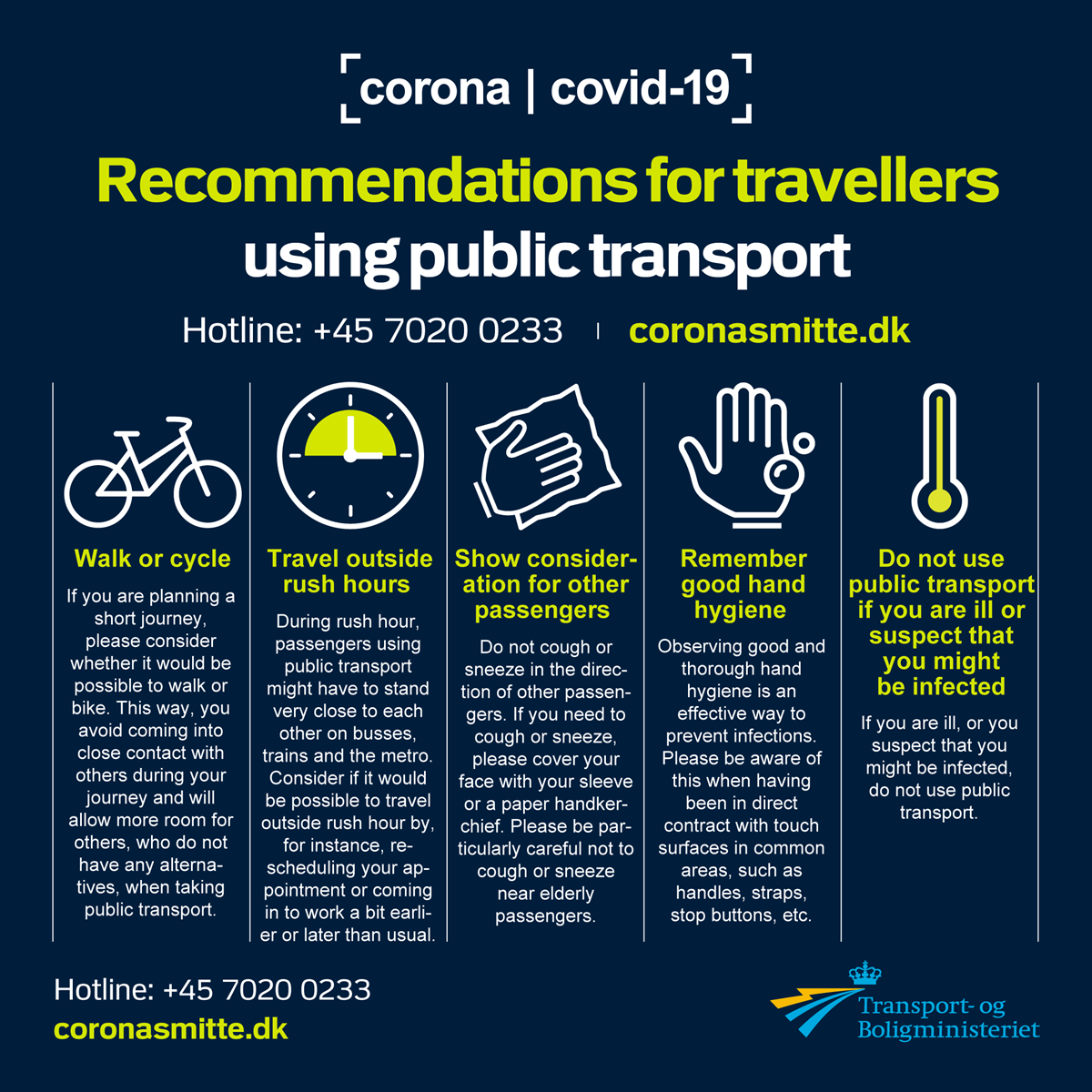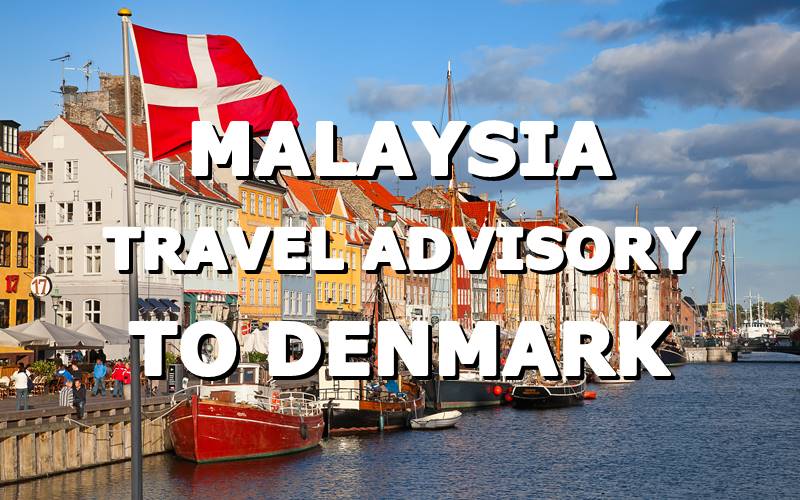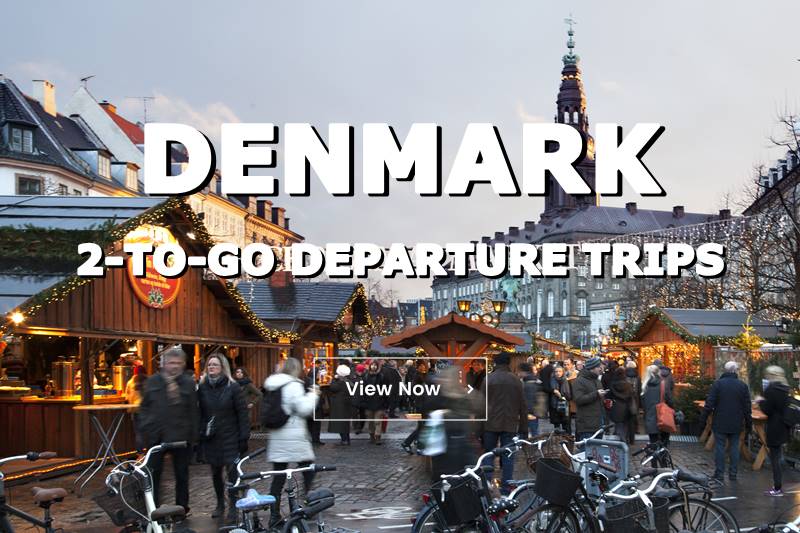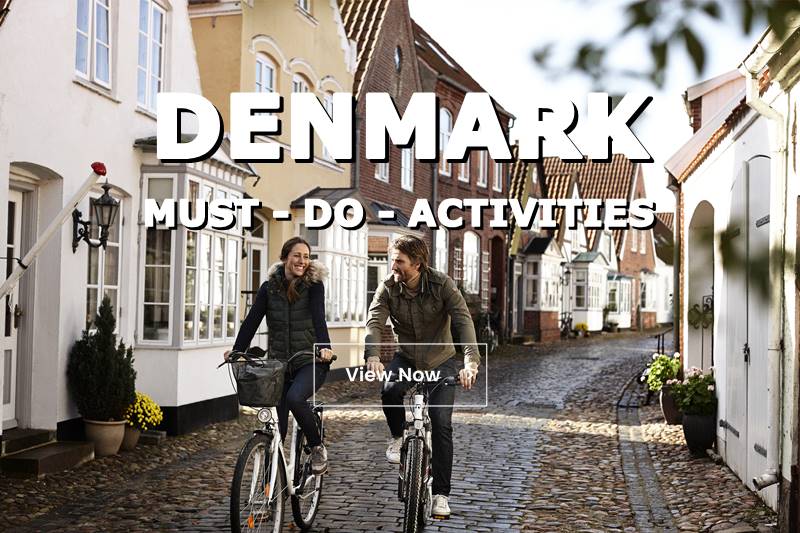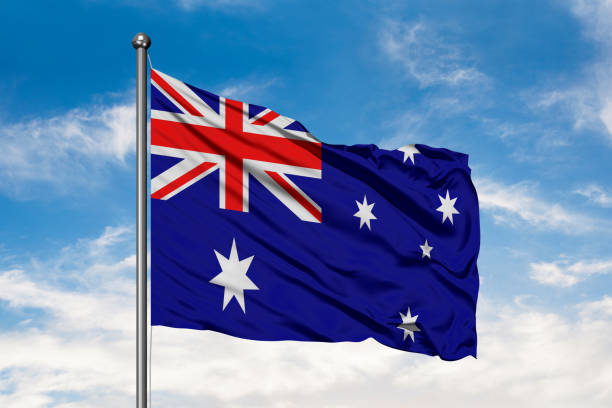【DENMARK】WILL CLOSE ITS BORDERS TO ALL FOREIGN VISITORS
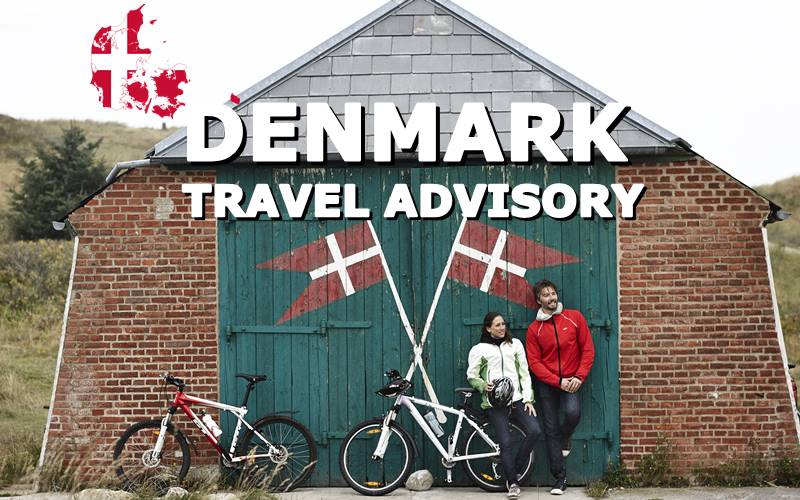
Coronavirus information for Denmark
BREAKING NEWS: The Danish government has announced that the borders to Denmark will be closed to foreign visitors as of Saturday 14th March 2020 at 12pm.
(Updated Saturday 14th March 2020)
Denmark will close its borders to foreign visitors from 12pm Saturday 14th March
The Danish Government has announced that as of 12pm Saturday 14th March 2020, the borders to Denmark will be closed, in an attempt to control the spread of the coronavirus. Danish citizens will be allowed to re-enter the country but unfortunately visitors from other countries will be refused entry.
These extraordinary measures will be in place until at least the 13th April. This is an extraordinarily difficult time for everyone and we hope that anyone planning to enter over the next month can get the help and advice they need to change their plans from their carriers or travel agents.
According to the statement released from the government, people wishing to visit family members in Denmark will also be denied entry, unless they are visiting a relative who is critically ill. We’re following the news as it happens and the most up to date information on the current situation can be found here: https://bit.ly/39N4DpO
Thank you to everyone who is helping to limit the spread of COVID-19 and for your understanding about this decision. We look forward to welcoming visitors back as soon as we’re allowed to. Stay well out there!
Closures within Denmark in reponse to the coronavirus
In response to the coronavirus the Danish Government has taken steps to close all public institutions and to encourage as many people as possible to be at home over the next two weeks. This means that business will not necessarily go on as usual for the imminent future here in Denmark, and visitors may experience some closures such as smaller shops, cafés, swimming pools or public gathering places like galleries, attractions and concerts.
Our thoughts are with all those affected by the virus and our gratitude goes out to all the health professionals around the globe working tirelessly to contain COVID-19.
Where to go next for information
If you have questions about the coronavirus in Denmark and what this could mean for your travel plans to Denmark, we have two places you can go to get fully updated.
- 1. We recommend you consult the travel guidelines related to the coronavirus from your national authority.
- 2. You can read the Danish Health Authority's Coronavirus Q&A and updated information from the Danish police in English and Danish.
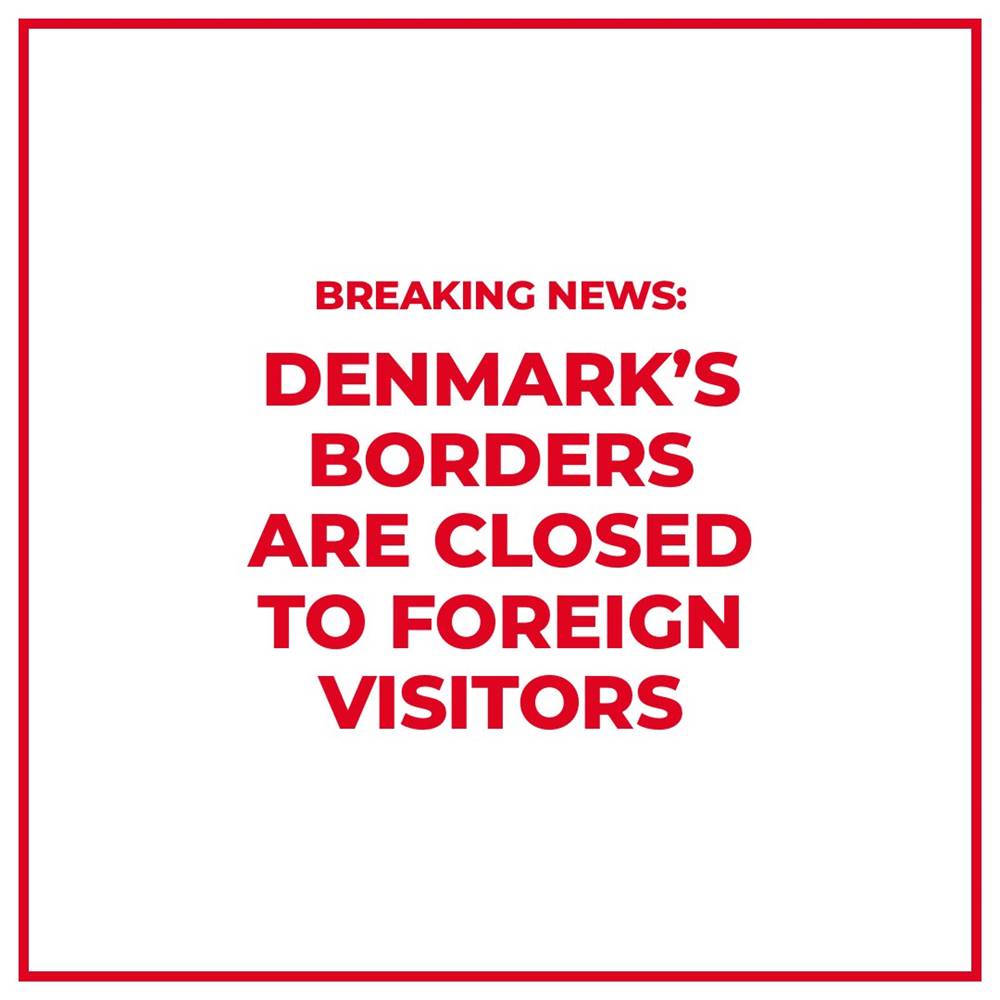 According Go VisitDenmark Facebook post stated:
According Go VisitDenmark Facebook post stated:
'The borders to Denmark are now closed to foreign visitors until at least the 14th April 2020, in an attempt to control the spread of the coronavirus. ?
In this extremely difficult time for many people around the globe, we appreciate your understanding about this decision and hope that any visitors planning to enter over the next month can get the help and advice they need to change their plans from their carriers or agents.
The most up-to-date information on the current situation can be found here: https://bit.ly/39N4DpO
Stay well and we really look forward to welcoming visitors back as soon as we can!'
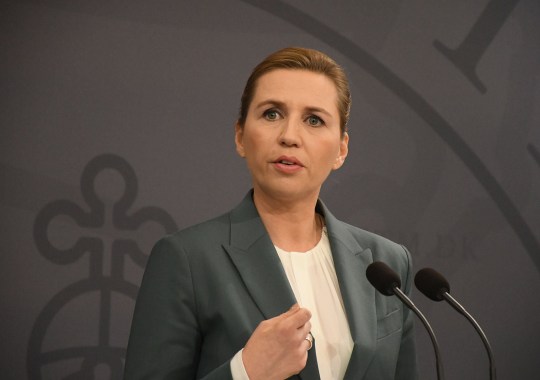 Danish Prime Minister Mette Frederiksen announced the new drastic measures at a press conference on 11 March 2020 Wednesday evening. She presented a list of measures aimed at least partially delaying the spread of COVID-19 across Denmark.
Danish Prime Minister Mette Frederiksen announced the new drastic measures at a press conference on 11 March 2020 Wednesday evening. She presented a list of measures aimed at least partially delaying the spread of COVID-19 across Denmark.
As statics of 15 March 2020, among nations with at least one million citizens, Denmark has the world's sixth-highest per-capita rate of positive coronavirus cases at 144.3 cases per million people.
In the daily report published by Staten’s Serum Institute that covered all 785 confirmed cases in (mainland) Denmark as of the morning of 13 March (16 others were confirmed later during the day and not included), it was reported that 67.8% were male and 32.2% female.
In terms of age, 10 were 0–9 years old, 30 were 10–19 years old, 134 were 20–29 years old, 135 were 30–39 years old, 253 were 40–49 years old, 159 were 50–59 years old, 50 were 60–69 years old, 5 were 70–79 years old, 7 were 80–89 years old, and 2 were 90+ years old.
In terms of origin, 265 had been infected in Austria, 60 in Italy, 2 in Germany, 1 each in Iran, the Netherlands, Spain and the United States, and 158 had been infected within Denmark, while data was pending for the remaining (well above half of those were infected abroad).
In terms of residency, 324 live in the Capital Region (160 in Copenhagen, 79 in the Copenhagen upland, 85 in north Zealand, none in Bornholm), 103 in Region Zealand (53 in west and south Zealand, 50 in east), 130 in the Region of Southern Denmark (50 in Funen, 80 in south Jutland), 175 in the Central Denmark Region (154 in east Jutland, 21 in west) and 47 in the North Jutland Region, while the remaining 6 are currently in Denmark but live abroad.
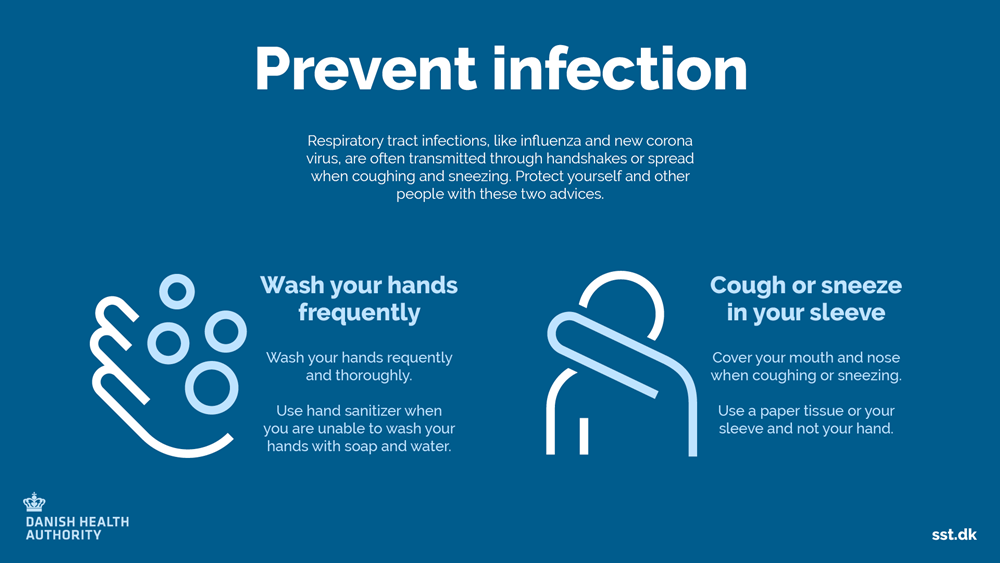 Denmark New measures against COVID-19
Denmark New measures against COVID-19
The Danish authorities' actions against coronavirus/covid-19 on Wednesday, 11 March, 2020.
Students at all educational institutions are sent home
Pupils and students in all public youth education and higher education etc. will be sent home as soon as possible and no later than Friday, 13 March 2020 for two weeks. Private institutions are encouraged to do the same. For boarding school students, it must be agreed locally which students can stay at the school until the school reopens.
All indoor cultural institutions, libraries, leisure facilities, etc. will close
All indoor public cultural institutions, libraries, leisure facilities and similar indoor activities will be closed as soon as possible and no later than Friday, 13 March 2020 for two weeks. Public service providers such as news media and emergency services are exempt. All private providers, self-governing institutions, voluntary associations and religious communities, etc. are strongly encouraged to do the same.
All public servants who do not perform critical functions are sent home
All public servants who do not perform critical functions will be sent home as soon as possible and no later than Friday, 13 March, 2020 for two weeks. As far as possible, they must work from home. If this is not possible, they will be sent home with pay. Public employees who have been sent home and do not work from home continue to be available to the employer and may also be required to assist with the performance of necessary community functions. Critical functions are aimed at, for example, personnel in the health care sector, the elderly and care sectors, the police, the criminal defense service, emergency services, the meat inspection and the social vulnerable area. The fact that repatriation will involve the build-up of case piles and extended case processing times does not mean that the functions are considered critical.
The private labour market
All private employers are urged to ensure that as many people as possible work from home, leave or take leave, in compliance with contractual obligations, such as exports and deliveries. Furthermore, it is urged that only physical meetings, etc., are held if absolutely necessary and that other relevant measures are taken to ensure appropriate behavior in the workplace. It is assumed that maintenance of the necessary utilities is ensured, including e.g. food supply, grocery market, pharmacy, energy, water, waste management, telecommunications and IT infrastructure, financial infrastructure, etc.
Schools and day care facilities will close
All public schools and daycare facilities will close Monday, 16 March, 2020 and for two weeks. Municipalities establish emergency care. Grandparents should not look after children if they are particularly vulnerable to covid-19 due to age or health. Private institutions are encouraged to do the same. For boarding school students, it must be agreed locally which students can stay at the school until the school reopens.
Limited use of public transport
The use of public transport must be limited and spread over as much time and capacity as possible. Action has already been taken to ensure this, including driving with greater capacity. DSB is now introducing ticket booking requirements on all journeys on intercity and fast trains and on regional trains as soon as technically possible.
Restrictions on nursing home and hospital visits
Hospitals and nursing homes, etc. are urged to introduce stricter restrictions on visits with immediate effect.
Urgent legislation allowing for the imposition of special measures
On Thursday, 12 March, 2020, the Danish government will make made an urgent proposals that will allow the authorities, if necessary, to force, for example, the closure of private institutions, schools and daycare centres, ban events and other congregations where many people are staying close together.
Prohibition of gathering more than 100 people indoors
It will be prohibited for fairs and event organisers/companies, etc. to gather more than 100 people indoors. The ban is issued as soon as the emergency legislation comes into force at the start of week 12 2020. Until the ban is issued, it is encouraged that it be followed and that in general, the opportunity to keep an appropriate distance between guests, visitors etc. is ensured. It is also recommended that no more than 100 people gather indoors under private forms.
The Ministry of Foreign Affairs changes its travel advice
The travel advice guidelines follow global developments and change colour as infections, local restrictions, many Danes in countries with weak health systems in countries outside Europe dictate. Specifically, on 11 March, 2020, this means changes (orange) for areas in Germany, France and Switzerland and for the countries of Turkey, Thailand, Egypt and Vietnam. In addition, a special call for vulnerable groups to stay in Denmark.
Additional restrictions when entering Denmark
The Danish government is investigating the possibility of imposing additional restrictions on entry into Denmark. This applies, among other things. Possibility of forced medical examination on arrival, possibility of forced quarantine on arrival from red areas, possibility of rejection of foreigners arriving from red and orange areas at the border. Furthermore, it is generally possible to prohibit passengers on ships, including cruise ships, ashore.
Any action is taken with due regard to the maintenance of the necessary supply chains, including food supply and to the grocery market, so as not to hinder, as far as possible, companies' ability to receive deliveries from or export goods abroad.
PUTRAJAYA: Denmark is the latest country to be added into Malaysia's Covid-19 travel restriction list, following a decision by the European country to go into lockdown.
Minister in the Prime Minister's Department (Special Functions) Datuk Seri Mohd Redzuan Yusof (pic) said the restriction applies to all foreigners, including those who were in Denmark recently.
"All Denmark nationals and citizens of other countries who have been to Denmark are not allowed to enter Malaysia or be on transit at any of our entry points.
"Malaysians are advised to postpone non-essential travel to Denmark due to the risk of being infected with Covid-19.
"Malaysians returning from Denmark must undergo home quarantine for 14 days," said Mohd Redzuan at a press conference after chairing a multi-agency working committee meeting on Covid-19 here on Thursday (March 12).
The travel ban is effective March 14.
Prior to this, Malaysia has imposed travel bans on people coming from affected areas in China, Korea, Japan, Iran and Italy.
Source: Tourism Denmark , Ministry of Foreign Affairs Denmark , Politi , The Star Online, Bernama TV and Ministry of Health Malaysia
?? ?? ?? Denmark is a Scandinavian country comprising the Jutland Peninsula and numerous islands. It's linked to nearby Sweden via the Öresund bridge. Copenhagen, its capital, is home to royal palaces and colorful Nyhavn harbor, plus the Tivoli amusement park and the iconic “Little Mermaid” statue. Odense is writer Hans Christian Andersen’s hometown, with a medieval core of cobbled streets and half-timbered houses.
North of Copenhagen on Zealand Island is Kronborg Castle, portrayed as Elsinore in Shakespeare's “Hamlet." The Louisiana Museum of Modern Art in Humlebæk specializes in modern and contemporary painting. The city of Roskilde has a Gothic brick cathedral and the Vikingeskibshallen museum, with 11th-century Viking ships. On the mainland, the port city Aarhus is home to the Den Gamle By Museum, showcasing traditional buildings. Denmark, responsible for many iconic 20th-century designs of furniture, fashion and architecture, is also the birthplace of Lego. Billund’s Legoland theme park showcases the famous plastic brick toy. ?? ?? ??
Here is the Denmark Top 10 Things To Do!
- Drink Smorgasbord Eggnog
- Lunch with Polser
- Hike to a Buried Lighthouse - Rubjerg Knude
- Cheers with Glogg
- Explore a huge building made of LEGO bricks
- Can't miss out the Danish Pastries
- Stroll through rainbow corridor at AroS Art Museum
- Dine at World's Best Restaurant - noma
- Go for Oystersafari at Wadden Sea National Park
- Visit Kronborg Castle
?? ?? ??Find out another Top 9 Must Do Activities in Denmark here

